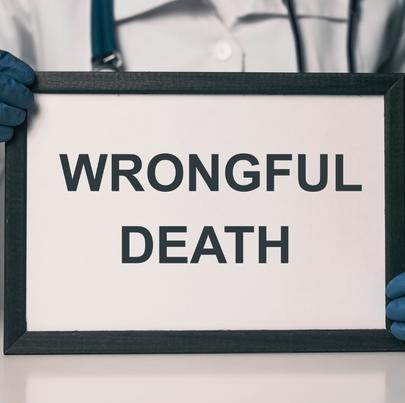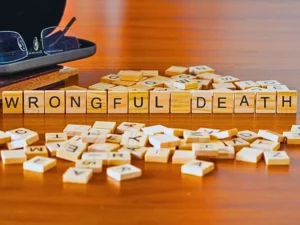Who gets the money in a wrongful death lawsuit will depend on factors, including the decedent’s marital status and surviving beneficiaries. A wrongful death claim is intended to make up for the losses suffered by the family after a loved one passes away.

The law of the state in which you are bringing a wrongful death claim will determine who may file and recover damages from such lawsuits.
Illinois Wrongful Death Act Claims
When someone’s carelessness or intentional act results in the death of a loved one, family members are permitted to file a lawsuit against the responsible party. Illinois law mandates that at-fault parties pay damages to the family’s survivors.
According to state law, wrongful death claims must be filed within two years of the death of a family member. If you do not take action within the statute of limitations, you could lose your right to pursue legal action and recover damages.
Common Causes of Wrongful Death Claims
The majority of wrongful death cases are the consequence of some type of negligence or carelessness. For example, this may include an auto collision, as fatality accidents are on the rise. Medical negligence, instances of premises liability, and cases involving product liability also commonly contribute to deaths for which the surviving family members may have grounds for legal action.
Additionally, families may bring a wrongful death claims following careless or purposeful acts, such as suing a nursing home for neglect leading to death or filing a lawsuit against a drunk driver who causes a fatal wreck.
Illinois Survival Act Claims
The Illinois Survival Act allows a decedent’s estate to receive those damages that he or she may have recovered through a personal injury lawsuit, if they had not tragically perished as a result of the accident.
In Illinois, the probate court will designate the executor of the decedent’s estate. The executor can then submit a claim using the Illinois Survival Act to receive damages that the deceased would have sought if they had lived, such as payment for medical costs, lost wages, and other sustained losses.
The estate of the deceased may also be compensated for the funeral, burial, and cremation expenses.
What is the Difference Between the Survival and Wrongful Death acts?
Simply put, the Illinois Survival Act permits a decedent’s estate to obtain damages for the decedent, whereas the Illinois Wrongful Death Act permits survivors to receive damages for the family.
Surviving families may decide to utilize the Illinois Wrongful Death Act and the Illinois Survival Act to obtain all the damages available to them. Families must prove that the loss of their loved one was a wrongful death brought on by carelessness under either act.
How does a Settlement for Wrongful Death Operate?
The family itself is the victim in this kind of personal injury lawsuit. They have experienced personal harm as a result of unjust death. As such, through this type of claim, they are pursuing compensation for what has occurred to them as a result of the loss of their family member.
Who Gets the Money in a Wrongful Death Lawsuit?
The wrongful death settlement in Illinois is not distributed equally to each person who is eligible to receive compensation under the law. The court will decide how the settlement monies will be split up at a separate hearing. For each person who is eligible to receive compensation in wrongful death litigation, the court will attempt to estimate their reliance on the deceased and will then attempt to split the settlement funds proportionately.
A Survival Claim Belongs to the Estate of the Deceased Person
A wrongful death lawsuit is distinct from a survival action. The deceased person’s estate is the rightful owner of the survival action. The will’s provisions are followed when dividing the proceeds.
Beneficiaries of the will who are not covered by the wrongful death statute may nonetheless get compensation.
The estate will receive compensation from survival actions for the suffering the deceased individual had between the time of their injury and their passing.
In this, the following is possible:
- Medical costs for treating the wounds
- Costs of burial and funeral
- The anguish and pain that the departed individual experienced before passing away
- Earnings lost between the injury and death
Punitive damages can be part of survival cases, but are excluded from wrongful death claims.
How Are Lawsuits for Wrongful Death Rewarded?
In terms of how it is paid, a wrongful death settlement functions similarly to any other personal injury settlement. An escrow account will be opened for the funds. The lawyer will be compensated for their costs after deduction. The funds will then be given to everyone who is eligible for them under the law.
Do not be concerned about the typical settlement when pursuing compensation for the loss of a loved one. Instead, focus on the things your family has lost and the money you urgently need. The loss of the deceased individual caused a sizable financial gap in your family that needs to be compensated.
For the sake of your family’s future, especially if you have lost a loved one who provided for you, money from a wrongful death lawsuit is crucial.
How an Attorney for Wrongful Death Can Aid Your Family
A knowledgeable wrongful death lawyer at a personal injury law firm will assist your family in several ways when you call them. Establishing the accident’s cause is the first step in obtaining a wrongful death settlement under both acts. If you find yourself asking the question, “when can you file a wrongful death lawsuit?” then you should contact a wrongful death lawyer for help with your case
You must demonstrate someone else’s negligence in wrongful death instances, just like you would in any other personal injury case.
The next step is to secure a just settlement for your family’s losses. Your Chicago wrongful death attorney will help you understand who gets the money in a wrongful death lawsuit, and negotiate with the insurance company or initiate legal action on your behalf.







